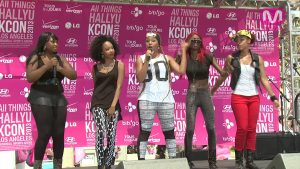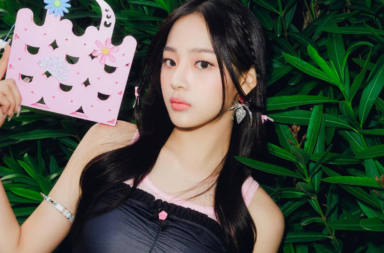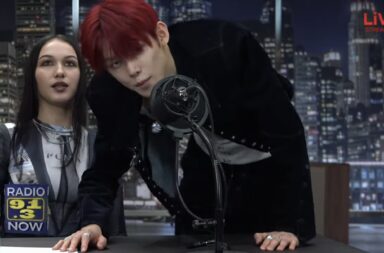 K-pop today may have an international fanbase, holding concerts and conventions worldwide, but the industry itself continues to look homogeneously Korean. There’s a smattering of other Asians who blend in well (especially after being disguised in heavy makeup, artificial hairstyles, and colored contacts), but it’s particularly half-Korean artists such as Michelle Lee who still stand out in appearance, and struggle against the prejudices that come with having darker skin and curlier hair.
K-pop today may have an international fanbase, holding concerts and conventions worldwide, but the industry itself continues to look homogeneously Korean. There’s a smattering of other Asians who blend in well (especially after being disguised in heavy makeup, artificial hairstyles, and colored contacts), but it’s particularly half-Korean artists such as Michelle Lee who still stand out in appearance, and struggle against the prejudices that come with having darker skin and curlier hair.
Onto this K-pop stage comes a recent debut, which has already caused an uproar through its members’ ethnicities — CoCo Avenue, an African-American duo based in Los Angeles. Originating as a group of six female fans across the States who periodically met to make K-pop covers (4minute’s “Hate,” GD&Taeyang’s “Good Girl”), the girls gained fame through videos on their YouTube channel, and performances at various KCONs and live events.
Today, remaining members Jenna Rogers and Jenny Johnson have since moved into entering the K-pop market – despite not being from South Korea, or of Korean descent. After a short stint working and performing in South Korea last year, they’ve begun to focus on producing original music. Their latest single, “Eottae,” has received a flood of comments from those taken aback by their release, from netizens who are pleasantly surprised, to those calling them out as “Koreaboos,” and those who insist their work is just not K-pop.
With “Eottae,” the unexpectedness of black women singing in Korean – not as spoof or satire, but as artistry – has violated people’s primordial understanding of the relationships between ethnicity, language, and culture production. Here are Koreans — of course they are singing in Korean. Now here are two African-Americans, and the underlying question seems to be: why are they even singing in Korean?
Society today may champion diversity and inclusion, but the backlash against CoCo Avenue’s work highlights the basic conceptions of identity we still cling to, despite the inexorable spread of globalization. Borders exist – demarcated by maps and treaties – but more than ever they are porous illusions, crossed by refugees on boats, businessmen on planes, web surfers online. Above interlocked nations we have developed human currents and shifting diasporas, as well as an unstaunched flow of ideas, technologies, and cultures.
 For a group like CoCo Avenue to consequently appear on the K-pop scene should not be surprising but anticipated, especially considering how actively entertainment companies have held contests and courted trainees from countries around the world. Yet stars like Super Junior’s Henry and GOT7’s Jackson have been easily accepted for singing in Korean despite being Chinese, while non-Asian faces like CoCo Avenue continue to be derided. These boundaries show that racism is well and alive in K-pop, and reveal the underlying assumptions of who is allowed to “perform” as Korean.
For a group like CoCo Avenue to consequently appear on the K-pop scene should not be surprising but anticipated, especially considering how actively entertainment companies have held contests and courted trainees from countries around the world. Yet stars like Super Junior’s Henry and GOT7’s Jackson have been easily accepted for singing in Korean despite being Chinese, while non-Asian faces like CoCo Avenue continue to be derided. These boundaries show that racism is well and alive in K-pop, and reveal the underlying assumptions of who is allowed to “perform” as Korean.
Of course, K-pop deterritorialized and gained traction across Asia long before reaching the West. Perhaps shared Confucian values and facial features were enough to maintain the shallow veneer of intimacy necessary for other Asian ethnicities to physically join K-pop. Yet Seo Taiji and The Boys, the first K-pop band, soared to fame by sampling everything from rock to The Simpsons in their songs; it was through them that the incorporation of Western sounds became standard in K-pop. Nor can one ignore the influence of historically black music – rap, hip-hop, jazz, reggae, dancehall – on Korean artists like BTS and Jay Park.
More so than ever then, it seems that K-pop is trying to have its cake and eat it too: entertainment companies are interested in sampling and melding cultures sonically, but prefer to keep the non-Asians backstage as choreographers and producers. As its music diversifies, its image remains frozen, perpetuating the myth of an industry that is uniquely Korean.
 Yet the production of this myth has long been a key component in the manufacturing of K-pop. Take sounds and images, displaced from their Western traditions, and blanch them into nonpolitical signifiers that are simply cool and edgy. Then package the pop using Asian faces to obscure any historical context. It’s a process of appropriation through localization that has been incredibly successful economically and politically, especially for a pan-Asian audience.
Yet the production of this myth has long been a key component in the manufacturing of K-pop. Take sounds and images, displaced from their Western traditions, and blanch them into nonpolitical signifiers that are simply cool and edgy. Then package the pop using Asian faces to obscure any historical context. It’s a process of appropriation through localization that has been incredibly successful economically and politically, especially for a pan-Asian audience.
In this sense, the emergence of non-Korean – and particularly African-American – artists like CoCo Avenue pose a unique threat to the Frankenstein identity of K-pop. What happens when those whose cultures have been stolen from suddenly appear on the scene? If Jenny and Jenna sing and rap well in Korean, will their brand of hip hop usurp the repackaged commodities that have been sold thus far? How will K-pop artists have to adjust, and renegotiate their understanding of “swag” in the face of its originators? And will the endless usage of blackface and the n-word ever end?
CoCo Avenue has already shown an active interest in tackling these issues as it repatriates K-pop to South Korea:
We’re taking more of a social stand, because the longer you’re in this fandom, the more you see problematic things when it comes to people of color…our trip is now to show black people in a better light than what [people] already know, and to have a voice in an industry that uses us a lot for entertainment purposes, but really doesn’t understand where we come from, and doesn’t even appreciate us. They appreciate these little pieces of the culture, like oh let’s wear baggy pants…but no we can’t hire black people, we can’t do things with black people.
That the Korean music scene has evolved to this extent shows the possibilities at play when mass media is displaced globally and reworked to signify new meanings. Really, K-pop is now just getting a taste of its own medicine. Once upon a time, the West was startled by how the Japanese and Koreans had transformed American pop for their own listeners; we’ve reached a new era in which Koreans are now also on the receiving end, seeing how their culture has been consumed and retooled by contemporary audiences around the world for their own ideologies.
 More than anything, this strikes me as exciting. To have the courage to put your own body on the front line against prejudice is rare, and to do so while producing music in a new language and culture will take great effort and patience. In this sense, CoCo Avenue reminds me of Chris Hart, another African-American artist who successfully broke into the J-pop music scene by moving to Japan, learning Japanese, and appearing on Japanese television. Earlier this April, he became a naturalized citizen of Japan.
More than anything, this strikes me as exciting. To have the courage to put your own body on the front line against prejudice is rare, and to do so while producing music in a new language and culture will take great effort and patience. In this sense, CoCo Avenue reminds me of Chris Hart, another African-American artist who successfully broke into the J-pop music scene by moving to Japan, learning Japanese, and appearing on Japanese television. Earlier this April, he became a naturalized citizen of Japan.
These startling combinations of ethnicities and languages and countries in pop culture matter more than ever as humans continue to migrate and challenge conventional notions of belonging. Especially for those of us who were born displaced, taught to speak languages and eat foods that did not match our ethnicity, CoCo Avenue is a reminder that we people who come from the outside also have voices, and are privy to making art about our experiences.
(Youtube [1][2][3], Arjun Appadurai: Modernity at Large, YomfYomf, Good.Mo.Music, Images via Youtube, CoCo Avenue Music, SM Entertainment )


